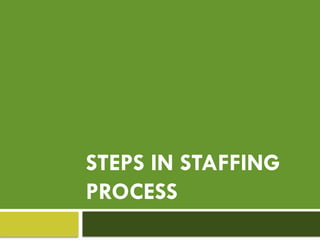STEPS IN STAFFING PROCESS (Principles of Management).pptx
- 3. Definition and Meaning of Recruitment ’é© According to Edwin B. Flippo,ŌĆ£ Recruitment is the process of searching the candidates for employment and stimulating them to apply for jobs in the organization ŌĆØ ’é© Meaning: ŌĆó Recruitment is the activity that links the employers and the job seekers. ŌĆó A process of finding and attracting capable applicants for employment
- 4. ’üČ A process of finding and attracting capable applicants for employment. The process begins when new recruits are sought and ends when their applications are submitted. The result is a pool of applications from which new employees are selected. ’üČ It is the process to discover sources of manpower to meet the requirement of staffing and to employ effective measures for attracting that manpower in adequate numbers to facilitate effective selection of an efficient working force.
- 5. Recruitment needs are of three types ’é© PLANNED the needs arising from changes in organization and retirement policy. ’é© ANTICIPATED Anticipated needs are those movements in personnel, which an organization can predict by studying trends in internal and external environment. ’é© UNEXPECTED Resignation, deaths, accidents, illness give rise to unexpected needs.
- 6. IMPORTANCE OF RECRUITMENT ’é© Attract and encourage more and more candidates to apply in the organisation. ’é© Create a talent pool of candidates to enable the selection of best candidates for the organisation. ’é© Recruitment is the process which links the employers with the employees. ’é© Increase the pool of job candidates at minimum cost. ’é© Help increase the success rate of selection process.
- 7. Recruitment Process 1. Identify vacancy 2. Prepare job description and person specification 3. Advertising the vacancy 4. Managing the response 5. Short-listing 6. Arrange interviews 7. Conducting interview and decision making
- 8. SOURCES OF RECRUITMENT ŌĆó TRANSFER ŌĆó PROMOTION ŌĆó RETRENCHED EMPLOYEE ŌĆó RETIRED EMPLOYEE INTERNAL EXTERNAL
- 9. ŌĆó Walk-ins ŌĆó Employee referrals ŌĆó Advertising ŌĆó Educational associations ŌĆó Professional agencies ŌĆó E-recruitment (general recruitment agents/ companiesŌĆÖ own sites) ŌĆó Word-of-mouth External Sources
- 11. Selection ’é© According to Thomas stone ŌĆ£Selection is the process of differentiating between applicants in order to identify and hire those with a greater likelihood of success on the jobs. ŌĆØ In simple wordsŌĆ”ŌĆ” ’é© It is the functions performed by the management of selecting the right employees. After identifying the sources of human resources, searching for prospective employees and stimulating them to apply for jobs in an organization . ’é© The objective of the selection decision is to choose the individual who can most successfully perform the job from the pool of qualified candidates.
- 12. Selection Process Flowchart Job analysis Recruitment Application form Written examination Group Discussion interview Medical examination Reference checks Line managers decision
- 13. Differentiation between recruitment and selection Recruitment 1. It the process of searching the candidates for employment and stimulating them to apply for jobs in the organization. 2. The basic purpose of recruitments is to create a talent pool of candidates to enable the selection of best candidates for the organization, by attracting more and more employees to apply in the organization. Selection 1. It Involves the series of steps by which the candidates are screened for choosing the most suitable persons for vacant posts. 2. The basic purpose of selection process is to choose the right candidate to fill the various positions in the organization.
- 14. 3. Recruitment is a positive process i.e. encouraging more and more employees to apply . 4. Recruitment is concerned with tapping the sources of human resources. 5. There is no contract of recruitment established in recruitment 3. Selection is a negative process as it involves rejection of the unsuitable candidates. 4. Selection is concerned with selecting the most suitable candidate through various interviews and tests. 5. Selection results in a contract of service between the employer and the selected employee.
- 15. Importance of Recruitment and Selection ŌĆó Helps to get a proper candidate. ŌĆó Help to increase success rate or individual & organization. ŌĆó Help to reduce the probability of turnover ŌĆó Helps to get organizations legal and social obligations. ŌĆó Helps to increase organization and individual effectiveness.















